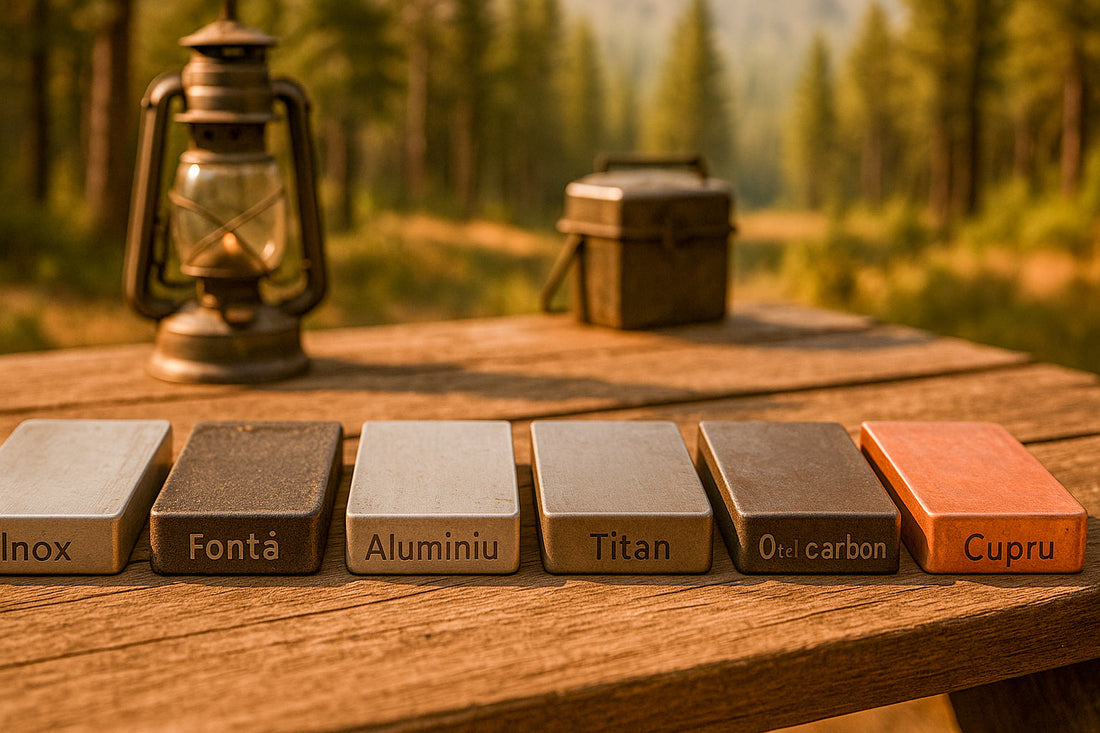
What is the best camping grill material?
Camping Grill Materials: How Do You Choose the Best One?
Choosing a camping grill is not just about shape or size. The material it is made of directly affects its thermal performance, durability, weight and ease of maintenance . In this article, we will compare the most common materials used for grills and explain why stainless steel is the right choice for adventures in the mountains or at sea.

What criteria should we look at?
A good camping grill should check the following:
1. Durability against the elements (moisture, salt, extreme temperatures)
The material's resistance to environmental factors is necessary for longevity. A material that doesn't rust easily will keep your grill in shape for years without any problems.
2. Heat retention for even cooking
A grill that maintains heat reduces fuel consumption (charcoal or wood). It also ensures better cooking by using the natural heat of the fuel and not the heat emanating from the metal. We will explain this in more detail below.
3. Easy maintenance without special solutions
In nature, you don't have access to special cleaning products. A grill that can be easily washed with water and a sponge simplifies the whole experience.
4. Light weight for portability
A lightweight material allows for easier transport, whether you're taking it hiking, in the trunk, or on your bike. Weight matters especially for solo adventurers or families with a lot of luggage.
5. Value for money
Investing in a durable and efficient material reduces the need for replacement. It is more cost-effective to pay once for a quality product than to frequently buy poor quality products or "Chinese knock-offs" as we call them.
Comparison between materials: advantages and disadvantages
Material |
Heat retention |
Corrosion resistance |
Maintenance |
Weight |
Verdict |
Stainless steel |
excellency |
excellency |
Light |
Average |
🔥Very balanced |
Cast iron |
Hello |
Low (rust) |
cumbersome |
Great |
Good for static use |
aluminum |
Average |
Hello |
Very light |
Light |
Occasional |
Titanium |
Very good |
excellency |
Light |
Very light |
Premium, expensive |
Carbon steel |
Hello |
Low |
Requires treatments |
Average |
Requires care |
Copper |
LOW |
Medium (oxidize) |
Average |
Average |
Rarely used for grilling |
Why do we use stainless steel for our grill?
The Ignita Journey portable camping grill is constructed from AISI 304 stainless steel , specially chosen for:
- Exceptional corrosion resistance - does not rust upon contact with water
- Mechanical and thermal resistance - does not deform easily
- Easy maintenance – quickly cleans with water and a sponge
- Aesthetics and hygiene – does not retain odors, does not stain
- Lifetime durability – smart investment for camping enthusiasts
🧠 Technical area - for enthusiasts
Composition and thermal behavior
-
Stainless steel (SS304) - contains chromium (over 18%) and nickel for protection against oxidation
- Cast iron - contains a lot of carbon; heats evenly but rusts easily
- Aluminum - conducts heat very well but can deform or even melt
- Carbon steel - transfers heat well, but requires oils and does not last long
- Titanium - very light and strong, but expensive and difficult to process
- Copper - best thermal conductivity, but not often used for grills due to oxidation and maintenance
Thermal conductivity (W/m K)
Thermal conductivity measures a material's ability to conduct heat. The higher the value, the faster the material heats up and cools down.

-
Stainless steel - retains heat well once heated. Effective if heated well before cooking
- Titanium - better suited for applications where weight matters a lot
-
Carbon steel - balance between heating and heat retention
- Cast iron - ideal for slow and even cooking
-
Aluminum - ideal for rapid heating, but requires constant fuel
- Copper - heats up so quickly that it can create thermal control losses
These values influence how quickly the grill heats up and how long it retains heat while cooking. We decided that stainless steel is ideal for camping because it maintains heat well into the night, using minimal fuel. This means you can make and maintain a campfire more easily.
Conclusion
Each material has its advantages and disadvantages, but for those looking for a durable, easy-to-use and maintain grill that's ready for any adventure, stainless steel is the balanced choice.
The Ignita Journey grill was designed with exactly these criteria in mind: portable, robust and worry-free in any conditions.
Do you want to make the smart choice?
👉Discover our stainless steel grill and see how it can transform your adventures in nature.